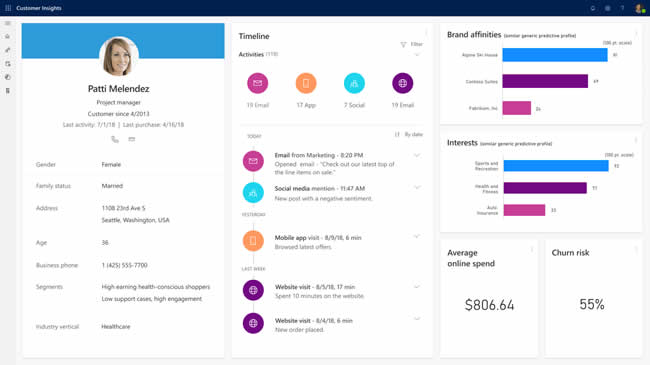Microsoft’s customer data platform (CDP), Dynamics 365 Customer Insights, offers advanced analytics and self-service capabilities. Since Spring 2019, it was available for B2C scenarios, and as of September 2019 the CDP addresses complex B2B journeys.
One of the major developments in the customer data platform market in 2019 no doubt has been the (announced) entry of additional large players such as Salesforce and Adobe.
Dynamics 365 Customer Insights helps maximize customer lifetime value by surfacing a 360-degree view of the customer – to help organizations unlock insights and determine the best action possible to drive personalized engagement at scale (Alysa Taylor)
While both companies lead in Forrester’s DMP report 2019, we still must wait for the launch of their CDPs (without wanting to add to the confusion regarding the differences between DMPs and CDPs).
In the meantime, that other big cloud player, Microsoft, has been offerings its customer data platform, Dynamics 365 Customer Insights, since the spring of 2019 at a competitive price. End September, Microsoft’s Alysa Taylor, Corporate Vice President, Business Applications & Global Industry at Microsoft, announced that Dynamics 365 Customer Insights henceforth would also address complex B2B journeys on top of the B2C scenarios on which the CDP initially focused.

Removing data and other silos
Microsoft hasn’t been making lots of noise about its Dynamics 365 Customer Insights customer data platform but showed some examples of companies using it earlier this year. By addressing B2B customer journeys, Microsoft now has a customer data platform enabling a 360-degree view of customers to enhance the customer experience across all industries.
Dynamics 365 Customer Insights is a real CDP with the typical characteristics that were defined earlier in 2019 by the Customer Data Platform Institute (CDP Institute).
With the addition of B2B capabilities, it also responds to the evolutions in the CDP market where B2B marketers are catching up with B2C marketers in terms of customer data platform deployment, per research from the CDP Institute released end May 2019.
What’s perhaps a bit different in the narrative of Microsoft is the more explicit focus on the need for collaboration between the chief marketing officer and chief information officer that is needed to “collect, analyze, and interpret vast amounts of customer data at scale in order to deliver personal and intuitive customer experiences” as Microsoft’s Shruti Shukla wrote in a blog on Microsoft’s Dynamics 365 Customer Insights customer data platform.

She calls the CIO – ‘the new experience maker’ and the CMO ‘the new data steward.’ Marketers obviously might object to that but, no matter how one turns it, IT plays an essential role in the deployment of customer data platforms. After all, if we want to use CDPs to remove data silos and work in a more customer-centric way, it’s about time we remove those barriers between IT and marketing for those who still fight that old battle.
It’s in bridging that gap between both that Sr. Product Marketing Manager Shruti Shukla states that “a customer data platform -like Dynamics 365 Customer Insights provides a win-win for IT and line of businesses across the organization such as sales, services, or marketing”.
Given the fact that customer data platforms keep getting a lot of attention from a personal data protection and compliance perspective with new regulatory frameworks in different countries (GDPR compliance boosted the CDP market, especially in Europe) and can be used for ample scenarios, CDPs are not just a matter of marketing. And it’s not as if there won’t be a stage after CDPs where more departments and data silos will be included in some environment where a holistic approach matters. Consumers are becoming more privacy-aware in general (see the recent Selligent ‘Global Connected Consumer Index‘, for instance), and that will be increasingly felt in all industries and more business functions, further impacting the CDP market.
Anyway, customer data platforms, of course, aren’t just about data governance and data compliance, but both are vital, and there is no way to have a holistic customer view without removing those internal silos beyond the dimension of systems.
Inside Microsoft’s Dynamics 365 Customer Insights CDP
In the meantime, Microsoft’s CDP, Dynamics 365 Customer Insights, is here, both for B2C as B2B companies. Alysa Taylor wrote about the new capabilities that extend Dynamics 365 Customer Insights beyond B2C scenarios in a blog that covers new Microsoft Dynamics 365 AI-driven insights applications.
Taylor: “Organizations that can adopt AI to manage and analyze data will be better positioned to build powerful relationship with customers over time…Dynamics 365 Customer Insights helps maximize customer lifetime value by surfacing a 360-degree view of the customer – to help organizations unlock insights and determine the best action possible to drive personalized engagement at scale”.
Intended as a line of business-managed system, Dynamics 365 Customer Insights helps reduce the burden on IT, simplifying data unification and systems integration along with built-in compliance and security protocols that safeguard all customer data in a hands-off fashion (Shruti Shukla)
Customer data platform experts will certainly also recognize the key characteristics (or benefits) which Shruti Shukla summarizes in her blog on Microsoft Dynamics 365 Customer Insights:
- Unification of data – discover, ingest, and store data from all sources and channels, with persistent storage.
- Self-service – business users, marketers in many cases, who prefer not to have IT around too much can rest assured, line of business can do quite a bit without IT.
- Data-driven decisions – Microsoft’s CDP comes with analytics, artificial intelligence, and machine learning to go from data to insights and actions, the latter with pre-built connectors for all those tools and platforms companies use (emails, POS, social, etc.).
- Data ownership – that doesn’t need too much explanation. Quote: “with Dynamics 365 Customer Insights, organizations have complete control over their data as it resides in their own tenant”. Customer data can be connected with Microsoft Power BI to customize dashboards and reports
- Data protection and compliance – identity resolution and a single unified view of each customer that should make it easier to maintain compliance, whereby the GDPR is explicitly mentioned.
Pricing starts at $1,500 per tenant per month for 100,000 profiles. Competitive indeed. Yet, as per usual, it’s the use cases and scenarios that need to drive the decision whether to deploy a CDP from a specific vendor or not, although, of course, your existing platforms and how you want to organize customer data management and analysis – with IT – matter as well.
As one of the customers of Dynamics 365 Customer Insights, Marston’s PLC, emphasizes: “The real benefit of Customer Insights is that it keeps us within the Microsoft Stack” (mentioning the connection to Dynamics 365 Sales; Azure Machine Learning, Azure SQL Servers,…).”.
All images belong to their respective mentioned owners.

